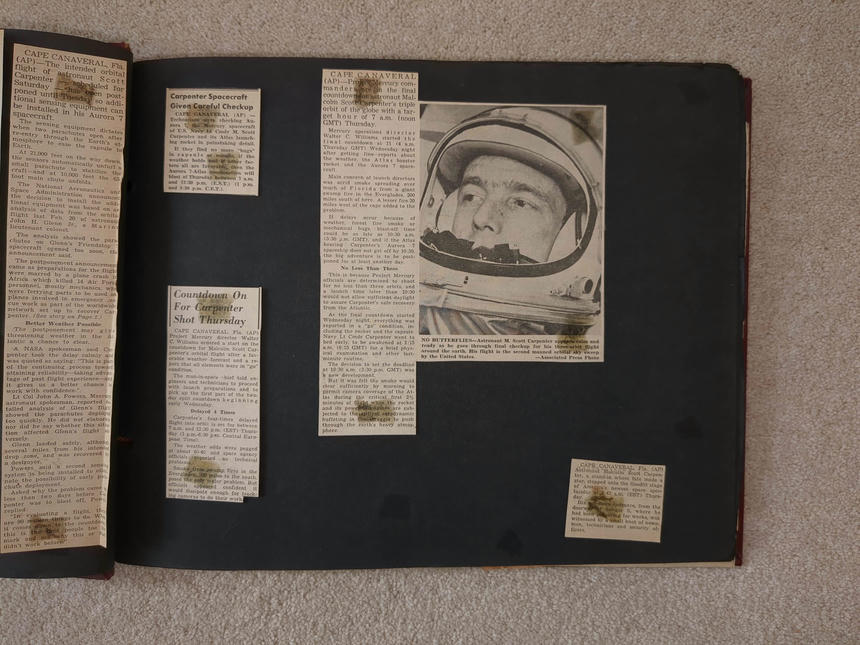Scrapbook 2: May 1962 — Scott Carpenter

Carpenter Spacecraft Given Careful Checkup
CAPE CANAVERAL (AP)—Technicians were checking Aurora 7, the Mercury spacecraft of U.S. Navy Lt Cmdr M. Scott Carpenter and its Atlas launching rocket in painstaking detail.
If they find no more “bugs” in capsule or missile, if the weather holds and if other factors all are favorable, then the Aurora 7-Atlas combination will blast of Thursday between 7 a.m. and 12:30 p.m. (E.S.T.) (1 p.m. and 6:30 p.m. C.E.T.).
Countdown On For Carpenter Shot Thursday
CAPE CANAVERAL, Fla. (AP) Project Mercury director Walter C. Williams ordered a start on the countdown for Malcolm Scott Carpenter’s orbital flight after a favorable weather forecast and a report that all elements were in “go” condition.
The man-in-space chief told engineers and technicians to proceed with launch preparations and to pick up the first part of the two-day split countdown beginning early Wednesday.
Delayed 4 Times
Carpenter’s four-times delayed flight into orbit is set for between 7 a.m. and 12:30 p.m. (EST) Thursday (1 p.m.-6:30 p.m. Central European Time).
The weather odds were pegged at about 60-40, and space agency officials reported no technical problems.
Smoke from swamp fires in the Everglades, 200 miles to the south, posed the only major problem. But officials appeared confident it would dissipate enough for tracking cameras to do their work.
CAPE CANAVERAL (AP)—Project Mercury commanders are in the final countdown for astronaut Malcolm Scott Carpenter’s triple orbit of the globe with a target hour of 7 a.m. (noon GMT) Thursday.
Mercury operations director Walter C. Williams started the final countdown at 11 (4 a.m. Thursday GMT) Wednesday night after getting fine reports about the weather, the Atlas booster rocket and the Aurora 7 spacecraft.
Main concern of launch directors was acrid smoke spreading over much of Florida from a giant swamp fire in the Everglades, 200 miles south of here. A lesser fire 20 miles west of the cape added to the problem.
If delays occur because of weather, forest fire smoke or mechanical bugs, blast-off time could be as late as 10:30 a.m. (3:30 p.m. GMT), and if the Atlas bearing Carpenter’s Aurora 7 spaceship does not get off by 10:30, the big adventure is to be postponed for at least another day.
No Less Than Three
This is because Project Mercury officials are determined to shoot for no less than three orbits, and a launch time later than 10:30 would not allow sufficient daylight to assure Carpenter’s safe recovery from the Atlantic.
As the final countdown started Wednesday night, everything was reported in a “go” condition, including the rocket and the capsule. Navy Lt Cmdr Carpenter went to bed early, to be awakened at 1:15 a.m. (6:15 GMT) for a brief physical examination and other last-minute routine.
The decision to set the deadline at 10:30 a.m. (3:30 p.m. GMT) was a new development.
But it was felt the smoke would clear sufficiently by morning to permit camera coverage of the Atlas during the critical first 2½ minutes of flight when the rocket and its powerful engines are subjected to the stiffest aerodynamic buffeting in the struggle to push through the earth’s heavy atmosphere.
NO BUTTERFLIES—Astronaut M. Scott Carpenter appears calm and ready as he goes through final checkup for his three-orbit flight around the earth. His flight is the second manned orbital sky sweep by the United States. —Associated Press Photo
CAPE CANAVERAL, Fla. (AP) Astronaut Malcolm Scott Carpenter, a stand-in whom fate made a star, stepped onto the floodlit stage of America’s newest space spectacular at 3:42 a.m. (EST) Thursday.
His pre-dawn entrance, from the doorway of hangar S, where he had been preparing for weeks, was witnessed by a small knot of newsmen, technicians and security officers.